|
March 3, 2021 - No.
13
More
Deaths and Outbreaks Reported
Hold Governments to Account for
Tragic Consequences of COVID-19
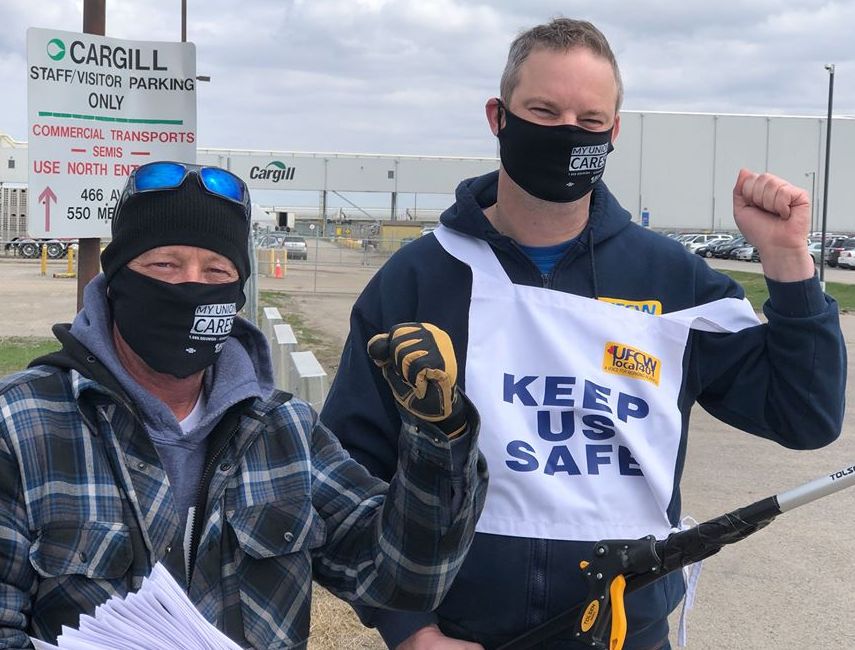 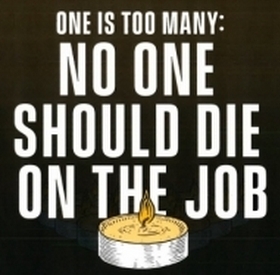
Alberta
• Two More Olymel
Workers Die
•
Demands of Olymel Workers
at Pork
Processing Plant in Red Deer, Alberta
• President of
United Food and Commercial Workers Local 401
Speaks About Olymel
Outbreak
Quebec
• Call to Liberate
Detainees at Immigration Holding Centre in
Laval, Quebec!
• Detainees'
Hunger Strike
Ontario
• Workplace
Outbreaks of COVID-19 in Toronto
Alberta
Two More Olymel Workers Die
Alberta Health Services (AHS) reported on
February 26 that two more
workers from the Olymel pork processing plant in
Red Deer have died
from COVID-19.
Henry
De Leon, 50, who had worked at Olymel for 15
years, died in hospital in
February 24. AHS reported that another Olymel
worker, a
woman, died on February 21. It has released
no further information
on her. There have been at least 500 cases
linked to the outbreak at
Olymel. Like Darwin Doloque who died on
January 28 at age 35, De
Leon came to Canada as a temporary foreign
worker from the Dominican
Republic 16 years ago and worked at the Olymel
plant ever since. He is
survived by his wife, also an Olymel worker, two
grown children and two
grandchildren.
Workers' Forum
sends sincere condolences to the families,
co-workers, and friends of
those who have passed away.
In
a statement on February 26 mourning the death of
Henry De Leon, United
Food and Commercial Workers (UFCW) Local 401
condemned the actions of
the company and the Alberta government
which failed to respond to the demands of the
union and the Olymel
workers for a timely temporary closure of the
plant to stop the spread
of the virus. "We meant it when we said that we
didn't
want this to turn into another Cargill," said
Secretary Treasurer
Richelle Stewart. "Our union has lived through
this horror before. We
know the early warning signs." The union reports
that they are
investigating the circumstances around the death
of Henry De Leon.
Workers in well over 100 Alberta workplaces in
the food
industry,
including grocery stores, have been infected
with COVID-19. Five
workers at meat packing plants in Alberta have
now died.
All of the workers who have died came to Canada
as refugees, as
immigrants or through the temporary foreign
workers program. Michael
Lee, a worker and union steward at a Calgary
Superstore also died
recently from COVID-19. Despite this terrible
loss, governments
continue to refuse to recognize COVID-19 as an
occupational disease,
continue to block workers and their
organizations from establishing
safe working conditions, and allow the oligarchs
who have seized
control of the sector to act with impunity.
The
deaths and the company's refusal to implement
specific measures
demanded by the workers, based
on their experience as to what is needed to stop
the spread of the virus, makes their fight to
have the final say over
what constitutes safe working conditions even
more urgent.
For
months now, workers in the meat packing plants
have been
fighting non-stop to make sure that their
workplaces are safe, are not
making the workers sick with COVID-19 and are
not putting their lives
in danger. They are facing governments which
defend the private
monopolies when they impose conditions within
the plants that cause
harm to the workers and when they declare that
working conditions are
safe even though this is not the case. This is
not acceptable and life
itself is shows that governments must be helod
to account for not doing
their duty to society.
Workers'
Forum firmly supports the fight of the
meat packing
workers for their demands to be met and calls
upon all workers to
support it.

Demands of Olymel Workers at
Pork Processing Plant in Red Deer, Alberta
 
The union representing workers at the Olymel
pork processing
plant
in Red Deer, Alberta reports that Olymel has
announced a potential
reopening of the plant on March 3. Workers
succeeded in forcing the
plant to close on February 17. Since then two
more Olymel workers have
died of COVID-19.
The union responded to
the company's announcement of the March 3
reopening in a letter posted on its website on
March 1.
Local President Thomas Hesse reports on the
results of a survey that
the union had conducted with 600 workers over
the previous 24 hours
which revealed:
"Over 75 per cent of respondents
indicated that they are scared
and/or nervous about returning to work; over 80
per cent of respondents
are unsure if the Plant is now safe; 75 per cent
of respondents
indicated they do not fully trust Olymel to keep
them safe; more than
50 per cent of respondents indicated they do not
fully trust government
officials to keep them safe; over 90 per cent of
respondents feel the
employer should compensate all Olymel employees
for the temporary
closure and introduce pandemic pay immediately;
nearly 90 per cent of
respondents indicated that they have struggled
financially during the
temporary closure."
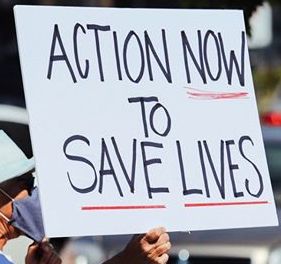 The
letter asserts that "we cannot agree that
Olymel's Red Deer Plant has
been made safe for our members, nor to a
reopening of the Plant, until
our list of action items has been fulfilled."
The Union calls on the
company and government health official to delay
the reopening until the
workers are certain that it is safe. The
letter asserts that "we cannot agree that
Olymel's Red Deer Plant has
been made safe for our members, nor to a
reopening of the Plant, until
our list of action items has been fulfilled."
The Union calls on the
company and government health official to delay
the reopening until the
workers are certain that it is safe.
The Olymel
workers are demanding specific changes be made
including: Involving the
workers
in decisions about what is needed to make the
workplace safe; refresher
safety training for all employees before
reopening; a joint agreement
on what would trigger, in the case of future
outbreaks,
reduced production or closure of the plant;
measures including
staggered break times, improved air quality,
reduced congestion in
common areas, increased sanitation, designation
of dedicated entrance
and exit doors with touchless entry, more
turnstiles, and improvements
to
lunchrooms to allow physical distancing. The
demand is also that
workers who
do not accept an immediate recall should not be
subject to any
discipline.

President of United Food and
Commercial Workers Local 401 Speaks About Olymel
Outbreak
United Food and Commercial Workers Union Local
401 President
Thomas
Hesse spoke about the serious COVID-19 outbreak
at the Olymel pork
processing plant in Red Deer, Alberta in an
interview in
early
February on iHeart Radio. At the time of the
interview a young Olymel
worker had died and 315 workers had tested
positive, but Olymel
had refused to comply with the workers' demand
for a temporary closure
of the plant. Since the workers forced the
company to close
the
plant on February 17 two more Olymel workers
have died.
Hesse
said that meat packing has been called the most
difficult and dangerous
work in the world.
"They are ramping up production
and have hired 200 to 300 workers
recently," Hesse said. "It is a box. People are
standing side by side
wielding razor sharp instruments. It is crowded
and they have just
added more bodies and more production to the
box, and the box is only
so big. Therefore, employees are bumping into
each other, they are in
very close proximity, and all the PPE in the
world, all the Plexiglass
shields in the world are not going to prevent a
certain measure of
social proximity." Hesse also explained that
Olymel had failed to
provide proper training for the new workers,
particularly in matters of
health and safety.
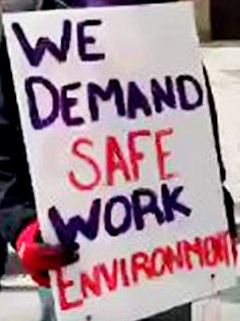 "
...We need to change the narrative around
COVID-19," he said. "I am
pretty tired of being told to wash my hands and
keep my distance and
wear a mask. I know those things. But if you
walk into an office
building, we would not get in the elevator if
there were 10 people on
the elevator. And so we've got these boxes,
where people are
bringing food to the tables of Canadians, that
are left to
self-regulate. There is no real penalty for an
employer to be drunk on
production and forget about their workers. And
that is exactly what is
happening. Every cow that is slaughtered, every
pig that is
slaughtered, every chicken that is slaughtered
is a profit for the
employer. So they move
down the line and they crank up the line speed.
People are buying food,
grocery retailers are making a killing right
now, the food is moving
through all of the intersections of the
production matrix, and we are
forgetting about these people in these
processing plants, about these
workers, these human beings who are faceless and
nameless," Hesse
said. "
...We need to change the narrative around
COVID-19," he said. "I am
pretty tired of being told to wash my hands and
keep my distance and
wear a mask. I know those things. But if you
walk into an office
building, we would not get in the elevator if
there were 10 people on
the elevator. And so we've got these boxes,
where people are
bringing food to the tables of Canadians, that
are left to
self-regulate. There is no real penalty for an
employer to be drunk on
production and forget about their workers. And
that is exactly what is
happening. Every cow that is slaughtered, every
pig that is
slaughtered, every chicken that is slaughtered
is a profit for the
employer. So they move
down the line and they crank up the line speed.
People are buying food,
grocery retailers are making a killing right
now, the food is moving
through all of the intersections of the
production matrix, and we are
forgetting about these people in these
processing plants, about these
workers, these human beings who are faceless and
nameless," Hesse
said.
"We need meaningful government regulation and
constant inspection.
COVID-19 is a moment by moment thing. Every
minute, every surface
matters," he said. Hesse gave the example of the
JBS plant were there
was no cleaning schedule for the microwaves used
by hundreds of workers
during their lunch break.
"These places need to be
watched. There need to be government
watchdogs. There need to be penalties if health
and safety principles
are not being adhered to, and the places should
be shut down if there
are outbreaks, the pause button should be hit,
there should be a
re-examination by experts, workers should be
interviewed, and the
places should
shut down." Hesse explained that the length of
shutdowns should depend
on the circumstances and severity of the
outbreak.
Hesse
stated that neither the federal nor provincial
governments
have shown any leadership, but leave the
industry to self-regulate, and
that this must change. He concluded by stating
that "No one wants to
talk about the fact that [COVID-19] is an
occupational illness. You
hear this phrase "community transmission" but
these workplaces are part
of the community. In fact in and of themselves
they are communities."
To listen to the interview, click here.

Quebec
Call to Liberate Detainees at Immigration
Holding Centre in Laval

Through
a call to action issued on February 23,
Solidarity Across Borders is
demanding the immediate release of migrant
detainees presently being
held at Montreal's Canada Border Services Agency
(CBSA) Laval
Immigration Holding Centre where there is a
COVID-19 outbreak. It noted
that as of that date, four cases had been
confirmed and that one
detainee had initiated an indefinite hunger
strike.
Migrants
are often detained if they lack identity
documents or if
the CBSA believes they may not show up for
deportation. Last spring,
the centre was the site of a courageous
eight-day hunger strike which
generated coast-to-coast support and resulted in
the release of most of
those detained at the time. Solidarity Across
Borders reports that
"Now, the migrant prison is filling up once
again," and points out that
the federal government's refusal to respond to
the ongoing demand for
Status For All and to implement a regularization
program for all
undocumented migrants "is the real reason these
detainees' lives are
now at risk.” It is estimated that between 12
and 15 migrants
are
currently detained at the Laval holding centre.
Visits have been
cancelled since March 16, 2020, limiting access
to legal support and
increasing the isolation of inmates.
 Last
November, the Trudeau government indicated that
it wanted to
implement alternatives to detention. "There are
many systems that we
will examine in the coming months and years to
see if we can improve
them," he told Le Devoir. This is the
usual liberal
claptrap to
cover up lack of principles and of any intent to
take action
to end the criminalization of migrants, provide
status for all and make
sure the migrants are safe, especially in such a
public health crisis. Last
November, the Trudeau government indicated that
it wanted to
implement alternatives to detention. "There are
many systems that we
will examine in the coming months and years to
see if we can improve
them," he told Le Devoir. This is the
usual liberal
claptrap to
cover up lack of principles and of any intent to
take action
to end the criminalization of migrants, provide
status for all and make
sure the migrants are safe, especially in such a
public health crisis.
Solidarity Across Borders
reports that the COVID-19 positive
detainees are being held in solitary
confinement. "Kept in small cells
with tiny windows, they are only allowed out to
shower or to make phone
calls. Some detainees report that their symptoms
were not taken
seriously, while others have received COVID-19
tests, but were not
given
the results -- leaving them in fear and
uncertainty about their
health." There is also a risk of further
spreading the virus, as
"guards continue to come and go from the
institution."
The
call comes within the context of rising cases at
provincial and
federal prisons across the country. "At Bordeaux
Prison, around 125
prisoners have contracted COVID-19 and the
entire prison has been
locked down -- leaving prisoners confined to
their cells for 23-24
hours a day, with no showers and little access
to outside support,"
Solidarity Across Borders
informs. The Ligue des droits et libertés, which
recently
denounced the "significant deterioration" of
prison conditions in
Quebec, supports the demand to liberate the
detainees at the Laval
Centre. "The Ligue remains very critical of the
detention of migrants,"
said communications officer Elisabeth Dupuis.
Solitary
confinement, notes Solidarity Across Borders,
"has been
widely denounced as a form of torture -- it is
unacceptable that such
measures are being used to contain the
outbreak." The organization is
calling for the immediate release of the
detainees and asking Canadians
to do what they can to help these vulnerable
people.
Workers' Forum supports the call to
liberate the detainees and put an end to
detention of migrants and subjecting them to
inhumane conditions which violate their human
dignity and endanger their health.
Governments must be held to account for the
tragic consequences of their actions and
policies which violate the most fundamental
human rights.
Solidarity Across Borders is calling on people
to contact
federal
Public Safety Minister Bill Blair, Immigration
Minister Marco Mendicino
and other government officials as well as their
local member of
parliament to demand the detainees' immediate
release.
For
further information and a sample e-mail script
and social media
hashtag, click
here.
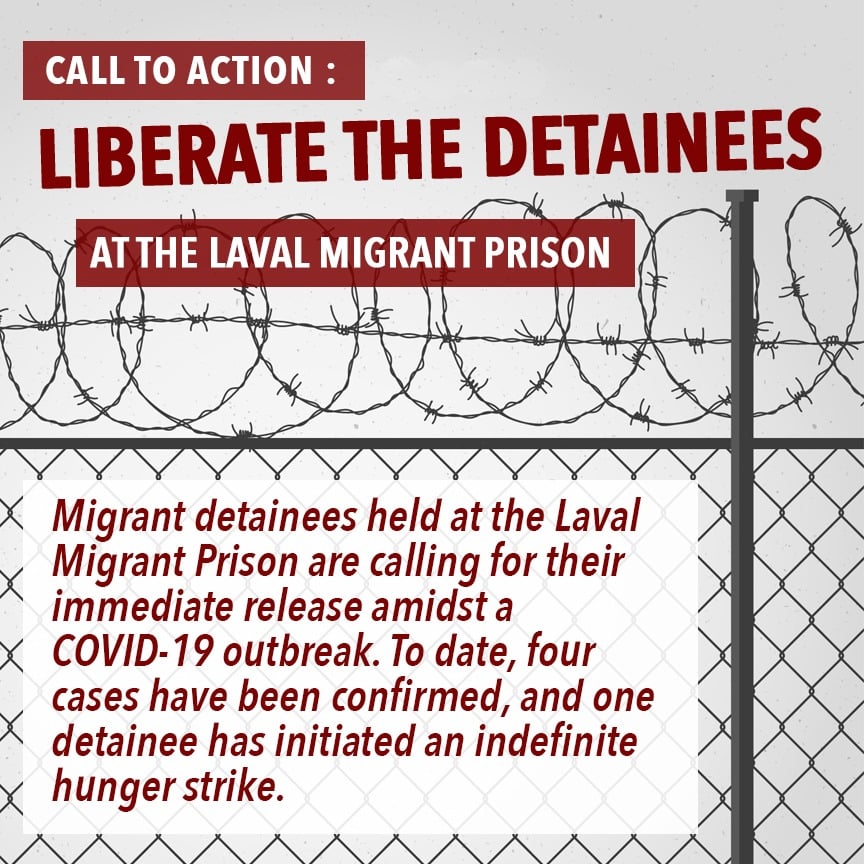 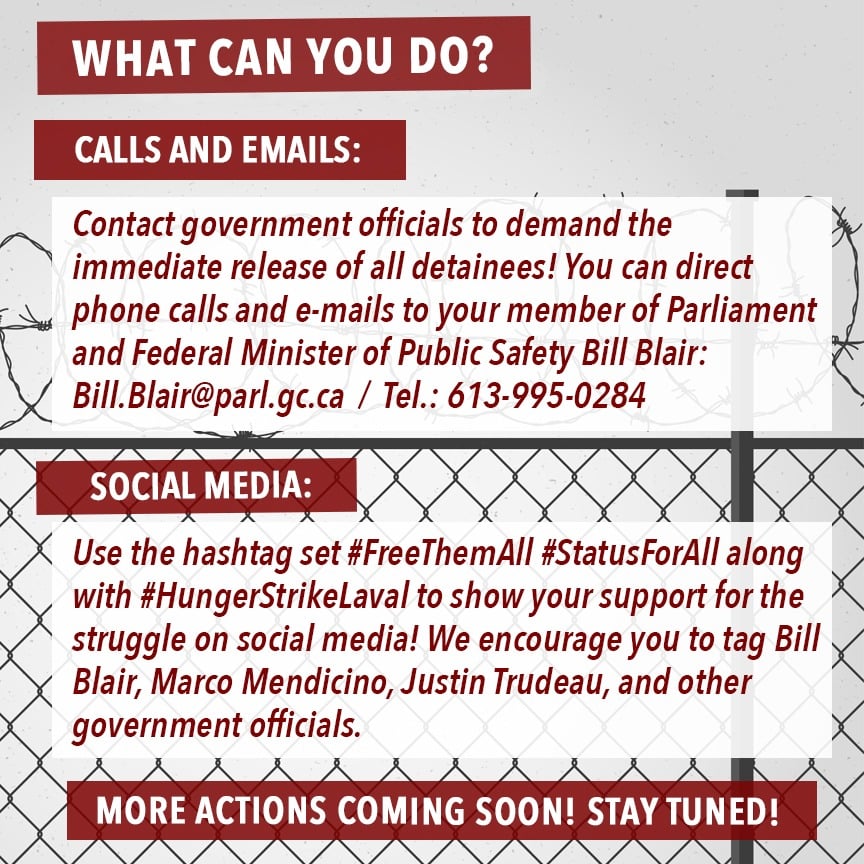

Detainees' Hunger Strike

February 28, 2021. Car
caravan supporting detainees at Laval
Immigration Holding Centre
Solidarity Across Borders' website
published a statement from Marlon, one of
the detainees at the Laval Immigration Holding
Centre:
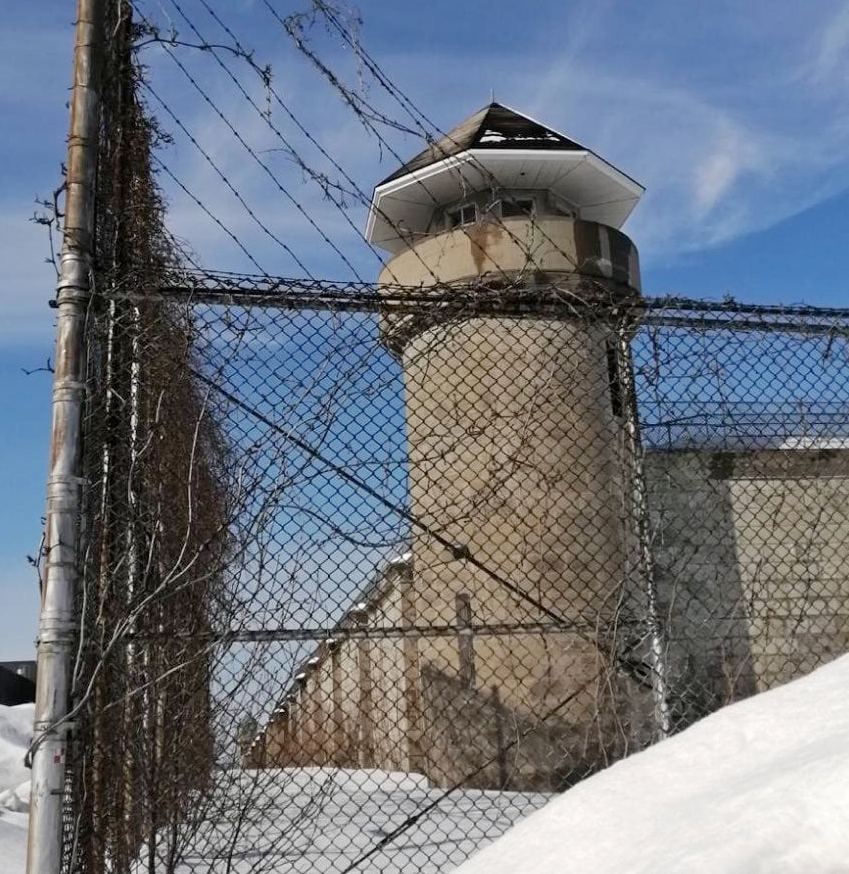 "I
declared an unlimited hunger strike on Monday,
February 15th, 2021; it
has now been six days. I am doing this as a form
of protest because my
fundamental rights, such as my right to health,
are being violated. I
contracted COVID-19 at the Laval migrant prison
because of being
confined to small spaces and by being exposed to
the personnel at the
centre, who come and go and expose us detainees
to the virus, and who
do not respect sanitation measures, for example
by removing their
masks. Contracting COVID-19 went from being a
risk to a reality for me,
and now we are four people who have been
infected. They have us
isolated in solitary confinement, without care,
and I believe that our
lives are at risk because we do not have any way
of protecting
ourselves from the virus. Now that we know it is
present in the centre
there is no way that it will disappear. There is
inadequate
ventilation, inadequate hygiene in the rooms,
which are dirty, and
since we are in solitary confinement we do not
even have a way of
washing our clothes. All of this is leading me
to fear for my life, and
I am experiencing depression and trauma. I am
hoping for a miracle from
God that anyone who is listening will have pity
on us and free us from
this prison, which is needed to avoid the spread
of this virus among
the migrant detainees, leading to many
potentially irreversible health
consequences. Millions of people have died of
this across the globe;
who is to say that we won't be next? We are
human beings with lives to
live and dreams to fulfill. Please, respect our
human rights." "I
declared an unlimited hunger strike on Monday,
February 15th, 2021; it
has now been six days. I am doing this as a form
of protest because my
fundamental rights, such as my right to health,
are being violated. I
contracted COVID-19 at the Laval migrant prison
because of being
confined to small spaces and by being exposed to
the personnel at the
centre, who come and go and expose us detainees
to the virus, and who
do not respect sanitation measures, for example
by removing their
masks. Contracting COVID-19 went from being a
risk to a reality for me,
and now we are four people who have been
infected. They have us
isolated in solitary confinement, without care,
and I believe that our
lives are at risk because we do not have any way
of protecting
ourselves from the virus. Now that we know it is
present in the centre
there is no way that it will disappear. There is
inadequate
ventilation, inadequate hygiene in the rooms,
which are dirty, and
since we are in solitary confinement we do not
even have a way of
washing our clothes. All of this is leading me
to fear for my life, and
I am experiencing depression and trauma. I am
hoping for a miracle from
God that anyone who is listening will have pity
on us and free us from
this prison, which is needed to avoid the spread
of this virus among
the migrant detainees, leading to many
potentially irreversible health
consequences. Millions of people have died of
this across the globe;
who is to say that we won't be next? We are
human beings with lives to
live and dreams to fulfill. Please, respect our
human rights."
On
March 2, Solidarity Across Borders reported on
Facebook that
“Yesterday, on Monday March 1, 2021, a new group
of detainees
launched a hunger strike to demand their
immediate release in the wake
of a COVID-19 outbreak at the Laval migrant
prison. The detainees are
taking over the strike started on February 15,
2021 by Marlon, also
detained in Laval. It's urgent that we all act
now and do everything
possible to support them.”

Ontario
Workplace Outbreaks of COVID-19
in Toronto
Since the second week of February Toronto
Public Health has
been
publishing information about workplace outbreaks
in the City of
Toronto. The data is broken down by size of
enterprise and the most
recent data is from February 25. On that date
there were 30 workplaces
that employ 20 or more people that had active
COVID-19 outbreaks
or outbreaks that had been declared over within
the preceding week. All
had started in January or February. Most
involved between two and ten
cases.
Of the six workplaces with over 20 cases,
four of the outbreaks had
been resolved and two were ongoing: the
outbreaks at Johnvince
Foods (83 cases), Dimpflmeier
Bakery (59 cases), Alumicor (21 cases) and Sky
Window Technologies (20
cases) have been declared over; the outbreaks at
Toronto Police College
(35 cases) and DECIEM (24 cases) are still
active.
Toronto
Public Health reports that as of February 23
there had been
50 outbreaks in food processing facilities and
225 in the category of
workplaces which includes offices, warehousing,
shipping and
distribution, construction and manufacturing.
The Toronto
Star
reported on February 16, at a time when there
were
large outbreaks at four food processing plants,
that in most of the
workplaces with outbreaks at that time workers
did not have access to
paid sick leave, including the unionized workers
at Maple Leaf Foods
and Belmont Meats which had outbreaks in January
and February
involving 26 and 96 workers respectively.
The list
of workplaces does not include health care
facilities such as hospitals
and long-term care homes whose outbreaks are
reported separately with no breakdown between
workers and
patients/residents.

(To access articles
individually
click on the black headline.)
PDF
PREVIOUS
ISSUES | HOME
Website:
www.cpcml.ca
Email: office@cpcml.ca
|

